KEEP THIS NEWSLETTER ALIVE!
Shop Online at https://www.irishnation.com

=============
IN THIS ISSUE
=============
=== News Snaps from Ireland
=== New Free Resources at the Site
=== The Flight of the Earls by Dr. John McCavitt
=== Hillside - a Poem by Jeremiah J. Shea
=== A Trio of Famous Irish Painters
=== An Evening in Lisdoonvarna by Kimberly Burke
=== YouTube Videos of Irish Interest
=== Shamrock Site of the Month: Celticattic.com
=== Gaelic Phrases of the Month
=== Monthly Free Competition Result
===========
FOREWORD
===========
We hope you enjoy this months issue that offers a poem,
a holiday reminisce, a look at three Irish Painters,
and a fine article about the Flight of the Earls, a
pivotal moment in Irish history.
Enjoy your FREE Ireland Newsletter!
Michael
P.S. Please DO FORWARD this Newsletter to a
friend or relative. If you have a website or Facebook
page or Blog (or whatever!) then you can help
us out by putting a link on it to our website:
www.ireland-information.com
Do tell your friends about us as this helps
to keep this newsletter free!
WE NEED YOUR HELP - CONTRIBUTE!
Got something to say? Don't keep it to yourself!
Why don't you submit an article for inclusion
in the next edition? Go here for more information:
https://www.ireland-information.com/newsletter.htm
Do you have access to a website? You can help to
keep this newsletter alive by adding a link to
any of our websites below:
https://www.irishnation.com
http://www.irishsurnames.com
https://www.ireland-information.com
http://www.allfamilycrests.com
http://www.irishpenpals.com
If you have an AOL or HOTMAIL account then you
may get better results by viewing this
newsletter online here:
https://www.ireland-information.com/feb12.htm
The only way that you could have been
subscribed to this newsletter is by filling
out a subscription form at the site whereupon
a confirmation notice would have been issued.
If you wish to unsubscribe then go here:
https://www.ireland-information.com/newsletter.htm
========================
NEWS SNAPS FROM IRELAND
========================
|
ECONOMY STRUGGLING DESPITE RECENT JOB GAINS The announcement that Internet giant Paypal is to provide 1000 new jobs in Dundalk over the next four years is a huge coup for the country and a sign that foreign multinationals are still very willing to locate in Ireland. The cost of labour is falling while the supply of qualified engineers and technicians continues to make Ireland an attractive location for Internet companies. The low rate of Corporation tax offered in Ireland also does no harm! Despite this good news the unemployment figures are terrible. Over 14% of the workforce are unemployed with no expectation that this figure will be reduced in 2012. Growth in the economy is forecasted to be in the 0.5% to 0.9% range, below even the Irish government hope that growth would reach 1.3%. Small and medium-size businesses are being decimated with as much as 50% (perhaps more) of retail outlets closing down since the 2008 downturn began. Lets state that again: half of all shops and retail outlets have closed down since 2008. 
Emigration continues to provide a depressing pressure-release valve as job-seekers desert the once roaring 'Celtic Tiger' (rapidly becoming a distant memory). The provision of funding by the IMF/EU/ECB continues to keep the country afloat, while critics of the loans point out that most of the cash being lent to the country at a punitive interest rate is being used to pay back the banks of Germany and France who lent Ireland the cash in the first place. The problems in Greece seem to have been at least 'pushed down the road' somewhat with the prospect of a sovereign debt default there receding. It certainly does not look like Ireland will either default or leave the euro at this stage, but there is no degree of certainly in the eurozone at the moment. Crippling mortgage debt in Ireland combined with ridiculous rates of pay to the public sector could yet scupper the relative stability in the economy. The imposition of a VAT hike (sales tax) along with big personal tax increases is putting further pressure on those businesses that have managed to survive, threatening to further damage the economy. It is a well known economic principle that the amount of tax collected declines as the tax rates increase. Whether the current government has failed to get the taxation balance correct remains to be seen. CAMPAIGN AGAINST PROPERTY TAX HOTS UP One of the conditions imposed by the IMF/EU/ECB in return for its high-interest loans is that Ireland introduces a property tax. Property taxes are not that unusual worldwide and have existed in many countries for decades. The situation in Ireland though is much more volatile with the history behind property ownership making the introduction of any new regime much more difficult. Ireland was declared a Free State in 1922 and a Republic in 1948. Prior to that there were several 'Land Acts' in the late nineteenth century which essentially bought the land of the country back from landlords (many of whom were absentee landlords located in England). The freehold transfers of farmland continued right up to the final decade of the twentieth century. 'Ground Rents' to landlords were nominal payments that continued to be paid as recently as 2005 and are still payable on certain properties. Amazingly the government is still paying ground rent to English landlords for Dublin Castle, the Botanic Gardens and even Government Buildings. 
Against this history of resentment by Irish property owners to both landlords and government it is hardly any surprise that the announcement of a new property tax is being greeted with such fierce opposition. The fact that the new tax is being forced on the country by foreigners (the EU/IMF/ECB) does not help the situation either. Some regard this as a loss of national sovereignty. This is a very tricky situation for the Fine Gael/Labour government. On the one hand they need to satisfy the conditions of the EU/IMF/ECB loans while on the other hand they do not want to alienate every house-holder in the country. Several independent T.D.'s (members of the Irish Parliament) as well as Sinn Fein have vowed to oppose the tax, with some T.D.'s even suggesting that they will go to prison on a point of principle, rather than pay the tax. FARMERS INCOME UP BY 70% IN TWO YEARS Figures from the Irish Central Statistics Office have shown that the changes in the economy of both Ireland and the world have not been bad for everyone. The price increases of basic foodstuffs such as meat, milk and cereals have provided a mini-boom for the Irish farmer. Despite this big increase the income of many farmers still lags well behind the national average wage - at 21,500 euro per year many farmers continue to operate second jobs and businesses whenever they can, just to survive. CLAMPDOWN ON WELFARE FRAUD STEPPED UP It is a sign of the economic times that extra resources are being focused on stamping out welfare fraud with over 500 people in the last 10 months having their payments cut from 144 euto to 188 euro per week, for failing to attend a job interview or training. Plans are afoot to interview over 150,000 claimants to establish what skills they possess to enable them to get work, and to assess what can be done to provide them with employment. SIXTH ANNUAL TED-FEST PASSES OF WITHOUT INCIDENT Careful now. Down with that sort of thing! The annual celebration of the finest-ever Irish Comedy TV show (albeit produced by Channel 4) took place without major incident or injury on Inis Mor, the largest of the Aran Islands, off County Galway. The enduring appeal of the cult television show starring the late Dermot Morgan was again demonstrated as 300+ of the partially insane and totally drunk devotees of the show held a series of events including the 'Lovely Girls' Competition and the 'Craggy Cup' football match. 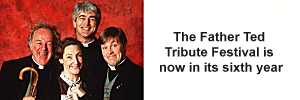
'There is a Dent in that Car!' - Clip from the actual Series 
Ted-Fest Lovely Girls Competition You can watch the real Father Ted on Channel 4 at: http://www.channel4.com/programmes/father-ted/4od Voice your opinion on these news issues here: https://www.ireland-information.com/newsletterboard/wwwboard.html |
===============================
NEW FREE RESOURCES AT THE SITE
===============================
IRISH HOLIDAY AND TOURIST FORUM
Post your question about holidaying in Ireland and
we guarantee an answer will be posted on the board:
https://www.ireland-information.com/irishholidays-irishtourist/irishtouristboard.html

NEW COATS OF ARMS ADDED TO THE GALLERY
The following 5 coats of arms images and family
history details have been added to the Gallery:
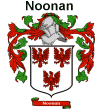
A: MacAleese, McArdle
J: Jameson
N: Newcomen, Noonan
View the Gallery here:
http://www.irishsurnames.com/coatsofarms/gm.htm
THE PERFECT WEDDING, ANNIVERSARY OR BIRTHDAY GIFT!
We now have over 100,000 worldwide names available.
Get the Coat of Arms Print, Claddagh Ring,
Screensaver, Watch, T-Shirt Transfer or Clock for
your name at:
https://www.irishnation.com/familycrestgifts.htm

Irish Design Ear-Rings from US$85 |

Ancient Celtic Ogham Language Jewellery |

Great Gifts! Family Crest Plaques and Shields |

New Designs available on our Coffee Mugs |
=====================
THE FLIGHT OF THE EARLS
by John McCavitt
=====================
|
The Flight of the Earls in 1607, when Hugh O'Neill, earl of Tyrone and Rory O'Donnell, earl of Tyrconnell boarded a ship on Lough Swilly bound for the continent never to return, is often considered a pivotal moment in Irish history, witnessing the demise of Gaelic Ireland, the onset of Protestant ascendancy and penal days for Irish Catholics. An event shrouded in controversy, the Flight is typically characterised as mysterious, and enigmatic to the point of defying explanation. Even the term 'the Flight of the Earls', conjuring up notions of a precipitate, tragic, perilous escapade tinged with romance and despair, has been the subject of dispute, with some commentators questioning the historical accuracy of terming the departure of the northern earls from Ireland as a 'flight' at all. Hostile commentators allege that far from being driven from their lands the earls voluntarily departed their native shores, indeed 'abandoned' their people. 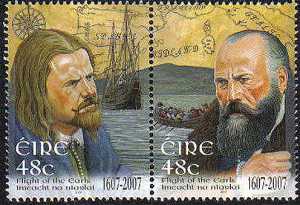
The reality is that the departure of the northern chieftains was indeed known at the time as the 'Flight of the Earls', that the earls fled in fear of their lives, so much so indeed that the Earl of Tyrone's young son, Con, aged about seven, could not be located before the ship departed from Rathmullan on Lough Swilly. Just as painfully for the earl of Tyrconnell, his pregnant young wife had to remain behind as well. Not only did the exiled earls seek to secure the safe passage of Con O'Neill and the countess of Tyrconnell, but the fugitive party on the continent endeavoured to persuade the Spanish authorities to support an invasion of Ireland spearheaded by the Irish regiment in Flanders commanded by the earl of Tyrone's son, Henry. As it happened a series of tragedies soon engulfed the families of O'Neill and O'Donnell. Within a short period of time, the earl of Tyrone's sons, Hugh and Henry, passed away, while the O'Donnells lost Rory, earl of Tyrconnell and Cathbarr, his brother. As for the earl of Tyrone, he became a victim of circumstance, his ambition to return to his homeland being frustrated by the fragile peace that persisted between England and Spain. Indeed, the international dimension to the Flight of the Earls is little appreciated. This resulted in part from the contemporary reputation of the earl of Tyrone in particular. 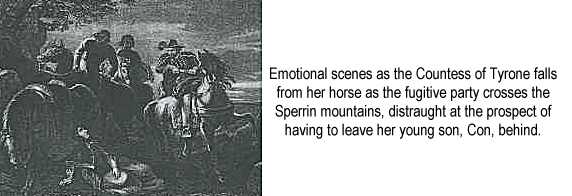
Following his spectacular victory at the battle of the Yellow Ford in 1598 his fame spread throughout Europe, earning him the accolade as 'the third soldier of his age'. Thus, when the earls arrived on the continent they were treated as international celebrities by allies and admirers but became targets for assassination by their enemies. Throughout his years in exile, 1607-16, the earl of Tyrone was reputed to have slept every night with a sword under his pillow. Overall, when the Flight of the Earls is contextualised against a longer view stretching back to the days of the Nine Years War, 1594-1603, it is a tale comprising a series of dramatic, sometimes comic, but more often poignant and tragic events. An episode in Irish History steeped in tales of war, passion, betrayal and derring-do, with heroes and villains of every hue, the Flight of the Earls constitutes a fascinating story spiced with references to spies, assassins and outlaws, kidnapping and hostage-taking, even references to contemporaneous Robin Hoods as well as a curious incident involving witchcraft. Such was the degree to which war reduced people to desperation that there were horrific scenes of cannibalism during the Nine Years War (1594-1603), a conflict which witnessed increasingly desperate crown forces resorting in some areas to mass murder tantamount to genocide. That Ireland was once a refuge for pirate fleets as powerful as any that plied the Barbary coast is little appreciated. To a considerable extent too, the Irish 'diaspora' originated in this period. The early seventeenth century witnessed Irishmen dispersed as far afield as the Netherlands, Spain, Italy, Newfoundland and even the Amazon. As a direct result of the Flight of the Earls, Irish soldiers, the original 'wild geese', saw service in Sweden, Denmark, Poland and Russia, many of them having been transported by the English government. So many themes that have resonated throughout much of modern Irish history had distant echoes in events culminating from the Flight. Thus the issue of extradition arose directly from the Flight when the English government sought to force continental powers to repatriate the fugitive earls. The English government attempted to disarm (decommission) potentially disloyal elements in Ireland. Catholic absentionism from political institutions also occurred, and the collection of a Catholic rent was organised. Protestant settlers in Ulster, fearing for their future in the event of the oft touted return of the earls to reclaim their lands by force, soon developed a siege mentality, surrounded as they were by a hostile indigenous population. The in-built 'apartheid' complexion of the Ulster colonization project, inspired by biblical teaching that it was fundamentally important to separate the weeds from the good corn, instituted a form of religious segregation in Ulster that far from dissipating with the passage of time is, it seems, becoming ever more prevalent. Overall, the story of the Flight of the Earls is a tale of epic proportions, an enthralling and seminal episode in the history of Ireland that has lost none of its drama and appeal in the passage of time. Arguably, indeed, it is only now, after the 400th anniversary of the Flight of the Earls in 2007, that Ireland has finally come to terms with the consequences of that momentous day in 1607 when the earls departed Rathmullan's shores, never to return. ~~~ 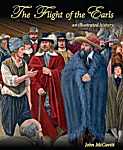 The book 'The Flight of the Earls' by Dr John McCavitt is available from here: http://www.theflightoftheearls.net |
===========================
HILLSIDE
By Jeremiah J. Shea (1903-1964)
===========================
|
There's a hillside back in Erin, Stretching high above the bay, Where the sunset turns the heather Into gold at close of day. Peace is there when twilight lingers And the valley down below Seems a far off faerie playland With the cottage lamps aglow. Comes the moon through heaven's curtain Sailing high and clear and bright, With a host of stars aglitter, Bringing beauty to the night. 
And the ancient ivied castle Seems as full of life as yore With the moon exchanging shadows For her partners on the floor. There the cares of life are little On the hillside o'er the bay, There the soul of man is grateful, At the closing of a day. For the peace that comes too seldom It is there that I would be, And if I should fly tomorrow I would take you all with me! Jeremiah J. Shea |
KEEP THIS NEWSLETTER ALIVE!
Solve your gift problem at: https://www.irishnation.com

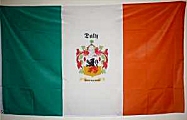
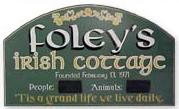
==============================
OSBORNE, LAVERY AND LEECH
(A TRIO OF FAMOUS IRISH PAINTERS)
==============================
|
Walter Osborne was born in 1859. He painted mainly in the French Brittany region of Quimperle but moved to England in 1884. His paintings of rural scenes that dominated his early years gradually gave way to an 'impressionistic' interpretation of those subjects that he had great empathy for, namely women, small children and old people. His superb images of young girls at play are still cherished by the National Gallery of Ireland: The Dolls School, The House Builders. 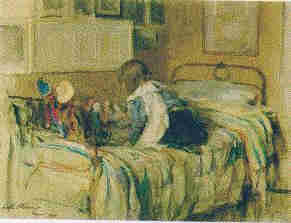
John Lavery was born in Belfast but was educated in Glasgow, London and Paris. He originally worked as an apprentice photographer but harboured ambitions to be a portrait artist. He became an official war artist and eventually a chronicler of his times with paintings such as 'The Ratification of the Irish Treaty in the English House of Lords, 1921' and 'Blessing of the Colors: A Revolutionary Soldier Kneeling to the Blessed'. His most famous work was perhaps that of his wife, Lady Lavery, 'The Red Rose' which was a painting that had a number of incarnations before it forever bore the face of the woman who was to adorn the Irish Pound note for half a century. 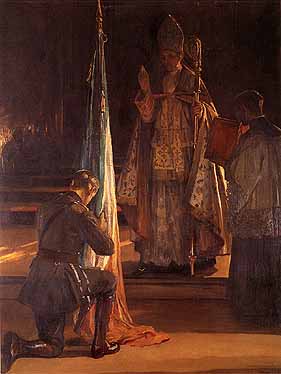
William John Leech was born in Dublin in 1881 and studied under Walter Osborne at the Royal Hibernian Academy Schools. He became increasingly interested in sunlight and shadow and this perhaps might explain why the famous painting 'The Goose Girl' was accredited to him. So proud of this wonderful interpretation of a girl in a bluebell field was the National Gallery of Ireland that it adopted the image as their logo, only to finally have to accept that the painting was in fact completed by the Englishman Stanley Royle. He can be regarded as one of the great Irish 'colorists' as can be seen by his superb image: 'Les Soeurs du Saint-Esprit, Concarneau', c. 1910-1912 which has to be one of the finest of all Irish paintings. 
|
KEEP THIS NEWSLETTER ALIVE! Visit https://www.irishnation.com
=========================
AN EVENING IN LISDOONVARNA
by Kimberly Burke
=========================
|
Though excited by the prospect of being in a different part of Ireland that evening, Lisdoonvarna seemed a bit sleepy when we arrived. 'Sunday nights are supposed to be good for music and dancing, right?' my husband Eric asked as we drove through town to find the Marchmont B&B. 'Looks a bit quiet tonight,' he added as we parked and liberated our luggage from the car. We'd left the wild beauty of Connemara that morning and the current landscape (the same type that thrilled us upon our arrival in Ireland) seemed uninspiring and conventional, adding to our growing concern that this night might be a bit of a let-down. Eileen Barrett met us with the usual Irish grace and friendliness that we'd grown so fond of and then showed us to our room. We inquired if she knew of any live music being played in town that night. She said she wasn't aware of anything but to try the sport pub. We walked the short distance to the pub. No music. We stayed for a pint ('See? The evening isn't going to be complete flop,' Eric pointed out) and to watch a bit of television. The barman suggested we try Lynch's Hotel and see if anything might be happening there. 
So we sauntered off, already feeling better having one under our belts. To our great surprise and happiness, the pub at Lynch's was hopping with all sorts of folk kids, young adults, older adults, maybe even a dog. Above the door was a birthday banner for Brigid and just inside a couple of fellows were setting up their band equipment. 'A birthday party fun!' quipped Eric. 'But we haven't been invited,' I protested. The barman quickly assured us that we were as welcome as if we'd lived there all our lives and proceeded to inquire after our drinking needs. Eric wondered if there might be a whiskey he'd previously overlooked and asked the barman what his favorite was. Without a word he went to the storage room and brought out a bottle of Jameson Crested 10 for Eric to try. 'Brilliant' was the verdict. We settled in with our drinks and watched the locals visit with each other while we waited for the music to start. Once it did, Brigid (apparently she worked for the hotel) and several friends commenced dancing. Watching a birthday celebrant having a complete blast at their own party has always made me happy and I felt privileged to witness this same joy while in a different country. Eventually I needed to visit the restroom. While washing my hands, a girl of about 10 years was filling up a squirt gun in the other basin. 'Is that to get your brother with?' I asked her. 'How do you know I have a brother?' she demanded with an astonished look. I replied that when I was her age, I had filled up a squirt gun or two with my brother being the intended target. She grinned and confessed that she had already gotten him in the pants so it looked like he had wet them. We both had a good giggle over that. I returned to our seat to find that Eric had abandoned it for the dance floor. A woman in a lavender jacket (we never got her name) either took pity on him for being alone or felt brave enough to ask the Yank to dance. Either way, they looked like they were having fun. When the song was over, the women rushed over to assure me that her intentions were good and not to worry. I wasn't, but it was a nice gesture on her part. At one point the band launched into a song that sounded a lot like a Gordon Lightfoot song we like. So at the next break we asked them about it and got a bit of a history lesson about Bobby Sands (the song was 'I Wish I Was Back in Derry') and the hunger strikes. When they played 'Fisherman's Blues” by the Waterboys, we raced for the dance area, anxious to move along with one of our favorite songs. Practically everyone danced and smiles were plentiful. We felt like we belonged and were sad when the song ended. As we were making our way through the crowd to leave when the party ended, Eric felt a tug on his sleeve. He looked over and there was Eileen! With a playful grin on her face, she asked us to leave the light on for her. 'No problem' we told her as we headed out into the chilly night. As we walked (or was it wobbled?) back to our B&B, we noted with great satisfaction that the evening had not been as quiet, nor indeed disappointing as we'd originally feared. In fact, it was one of the most enjoyable evenings we spent while in Ireland. And though we'd probably never be able to recreate the series of events that transpired that Sunday night in May of 2003, I'd like to think we could pop back into the pub at Lynch's someday and still feel the magical warmth of that evening. Kimberly Burke Newark, Ohio, USA |
==============================
YOUTUBE VIDEOS OF IRISH INTEREST
==============================
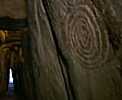
The Flight of the Earls - a pivotal moment in Irish History.

10 Things to know about Dublin before you Visit.
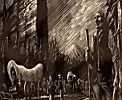
The History of Ireland - Part 1.
===========================================
SHAMROCK SITE OF THE MONTH: CELTICATTIC.COM
===========================================
Shop online for everything you need to decorate
your home and life with a Celtic Twist: Art,
Crafts, Irish & Scottish Baskets, Suncatchers,
Wind-Chimes, Music and Celtic Gifts. We offer a
delightful variety of Celtic Jewelry: Pendants,
Crosses, Rings, Hair Ties & more. All your
Irish Bath, Beauty and Herbal needs are in one
convenient location! The Majority of our products
are Irish, Scottish, Welsh made.
Get Free Shipping on most orders! Get a Free Gift
with each and every order.
http://www.celticattic.com
Phone orders 360-286-2307
===========================
GAELIC PHRASES OF THE MONTH
===========================
PHRASE: Is binn béal ina thost
PRONOUNCED: iss bin bail inna hust
MEANING: Silence is golden
PHRASE: Ní hé lá na gaoithe lá na scolb
PRONOUNCED: knee hay law nah gwee-heh law nah sculb
MEANING: The windy day is not the day for thatching
PHRASE: Is fearr rith maith ná drochsheasamh
PRONOUNCED: iss farr rih mot nah druch-shas-ivh
MEANING: He who runs away lives to fight another day
View the archive of phrases here:
https://www.ireland-information.com/irishphrases.htm
==================
COMPETITION RESULT
==================
The winner was: c7morgan@btinternet.com
who will receive the following:
A Single Family Crest Print (decorative)
(US$19.99 value)

Send us an email to claim your print, and well done!
Remember that all subscribers to this
newsletter are automatically entered into the
competition every time.
I hope that you have enjoyed this issue.
Until next month,

Michael Green,
Editor,
The Information about Ireland Site.
https://www.ireland-information.com
Click here to contact us